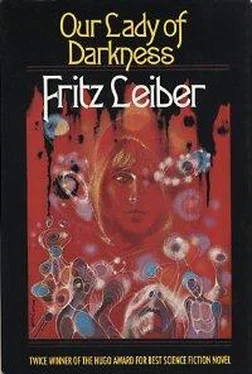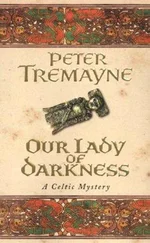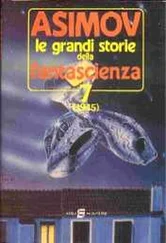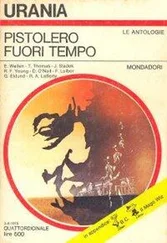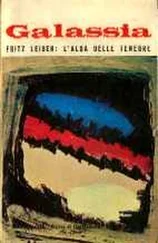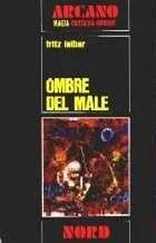“I don’t care,” Bonita said, pushing up against Saul closely, invading his space. “Please? Please?” she coaxed insistently.
Saul grabbed her suddenly, hugged her tight, and blew down her neck with a great raspberry sound. She squealed loudly and happily. Franz, glancing almost automatically toward Gun, saw him start to wince, then control it, but his lips were thin. Dorotea smiled almost as happily as if it were her own neck being blown down. Fernando frowned slightly and held himself with a somewhat military dignity.
As suddenly Saul held the girl away from him and said to her matter-of-factly, “Now look here, Bonny, this is another story I want to tell Franz—a very dull one of interest only to writers. There is no Story of the Invisible Nurse. I just made that up because I needed something to illustrate my point.”
“I don’t believe you,” Bonita said, looking him straight in the eye.
“Okay, you’re right,” he said abruptly, dropping his hands away from her and standing back. “There is a Story of the Invisible Nurse Who Terrorized the Locked Ward at St. Luke’s, and the reason I didn’t tell it was not that it’s too long—it’s quite short—but simply too horrible. But now you’ve brought it down upon yourself and all these other good people. So gather round, all of you.”
As he stood in the dark street with the light of the gibbous moon shining on his flashing eyes, sallow face, and elf-locked, long dark hair, he looked very much like a gypsy, Franz thought.
“Her name was Wortly,” Saul began, dropping his voice. “Olga Wortly, R.N.—(Registered Nurse). That’s not her real name—this became a police case and they’re still looking for her—but it has the flavor of the real one. Well, Olga Wortly, R.N., was in charge of the swing shift (the four to midnight) in the locked ward at St. Luke’s. And there was no terror then. In fact, she ran what was in a way the happiest and certainly the quietest swing shift ever, because she was very generous with her sleeping potions, so that the graveyard shift never had any trouble with wakeful patients and the day shift sometimes had difficulty getting some of them waked up for lunch, let alone breakfast.
“She didn’t trust her L.V.N. (Licensed Vocational Nurse) to dispense her goodies. And she favored mixtures, whenever she could shade or stretch the doctor’s orders to allow them, because she thought two drugs were always surer than one—Librium with the Thorazine (she doted on Tuinal because it’s two barbiturates: red Seconal with blue Arnytal), chloral hydrate with the phenobarbital, paraldehyde with the yellow Nembutal—in fact, you could always tell when she was coming (our fairy snooze mother, our dark goddess of slumber) because the paralyzing stench of the paraldehyde always preceded her; she always managed to have at least one patient on paraldehyde. It’s a superaromatic superalcohol, you know, that tickles the top of your sinuses, and it smells like God-knows-what—super banana oil; some nurses call it gasoline—and you give it with fruit juice for a chaser and you dispense it in a glass shot-glass because it’ll melt a plastic one, and its molecules travel through the air ahead of it faster than light!”
Saul had his audience well in hand, Franz noted. Dorotea was listening with as rapt delight as Bonita; Cal and Gun were smiling indulgently; even Fernando had caught the spirit and was grinning at the long drug names. For the moment the sidewalk in front of the German Cook’s was a moonlit gypsy encampment, lacking only the dancing flames of an open fire.
“Every night, two hours after supper, Olga would make her druggy-wug rounds. Sometimes she’d have the L.V.N. or an aide carry the tray, sometimes she’d carry it herself.
“ ‘Sleepy-bye time, Mrs. Binks,’ she’d say. ‘Here’s your pass to dreamland. That’s a good little girl. And now this lovely yellow one. Good evening, Miss Cheeseley, I’ve got your trip to Hawaii for you—blue for the deep blue ocean, red for the sunset skies. And now a sip of the bitter to wash it down—think of the dark salt waves. Hold out your tongue, Mr. Finelli, I’ve something to make you wise. Whoever’d think, Mr. Wong, they could put nine hours and maybe ten of good, good darkness into such a tiny time-capsule, a gelatin spaceship bound for the stars. You smelled us coming, didn’t you, Mr. Auerbach? Grape juice chaser tonight!’ And so on and so on.
“And so Olga Wortly, R.N., our mistress of oblivion, our queen of dreams, kept the locked ward happy,” Saul continued, “and even won high praise—for everyone likes a quiet ward—until one night she went just a little too far and the next morning every last patient had O.D.’ed (overdosed) and was D.O.A. (that’s Dead on Arrival, Bonny) with a beatific smile on his or her face. And Olga Wortly was gone, never to be seen again.
“Somehow they managed to hush it up—I think they blamed it on an epidemic of galloping hepatitis or malignant eczema—and they’re still looking for Olga Wortly.
“That’s about all there is to it,” he said with a shrug, relaxing, “except”—he held up a finger dramatically, and his voice went low and eerie—“except they say that on nights when there’s a lot of moonlight, just like this now, and it’s sleepy-bye time, and the L.V.N. is about to start out with her tray of night medicines in their cute little paper favor cups, you get a whiff of paraldehyde at the nurses’ station (although they never use that drug there now) and it travels from room to room and from bed to bed, not missing one, that unmistakable whiff does—the Invisible Nurse making her rounds!”
And with more or less appropriate oohs, ahs, and chuckles, they set out for home in a body. Bonita seemed satisfied. Dorotea said extravagantly, “Oh, I am frightened! When I wake up tonight, I think nurse coming I can’t see make me swallow that parry-alley stuff.”
“Par-al-de-hyde,” Fernando said slowly, but with surprising accuracy.
There was so much stuff in Saul’s room and such a variety of it, apparently unorganized (in this respect it was the antithesis of Gun’s), that you wondered why it wasn’t a mess—until you realized that nothing in it looked thrown away or tossed aside, everything looked loved: the stark and unglamorized photographs of people, mostly elderly (they turned out to be patients at the hospital, Saul pointed out Mr. Edwards and Mrs. Willis); books from Merck’s Manual to Colette, The Family of Man to Henry Miller, Edgar Rice to William S. Burroughs to George Borrow ( The Gypsies in Spain , Wild Wales , and The Zincali ); a copy of Nostig’s The Subliminal Occult (that really startled Franz); a lot of hippie, Indian, and American Indian beadwork; hash-smoking accessories; a beer stein filled with fresh flowers; an eye chart; a map of Asia; and a number of paintings and drawings from childish to mathematical to wild, including a striking acrylic abstraction on black cardboard that teemed with squirming shapes and jewel and insect colors and seemed to reproduce in miniature the room’s beloved confusion.
Saul indicated it, saying, “I did that the one time I took cocaine. If there is a drug (which I doubt) that adds something to the mind instead of just taking away, then it’s cocaine. If I ever went the drug route again, that’d be my choice.”
“Again?” Gun asked quizzically, indicating the pot paraphernalia.
“Pot is a plaything,” Saul averred, “a frivolity, a social lubricant to be classed with tobacco, coffee, and the other tea. When Anslinger got Congress to classify it as—for all practical purposes—a hard drug, he really loused up the development of American society and the mobility of its classes.”
Читать дальше
